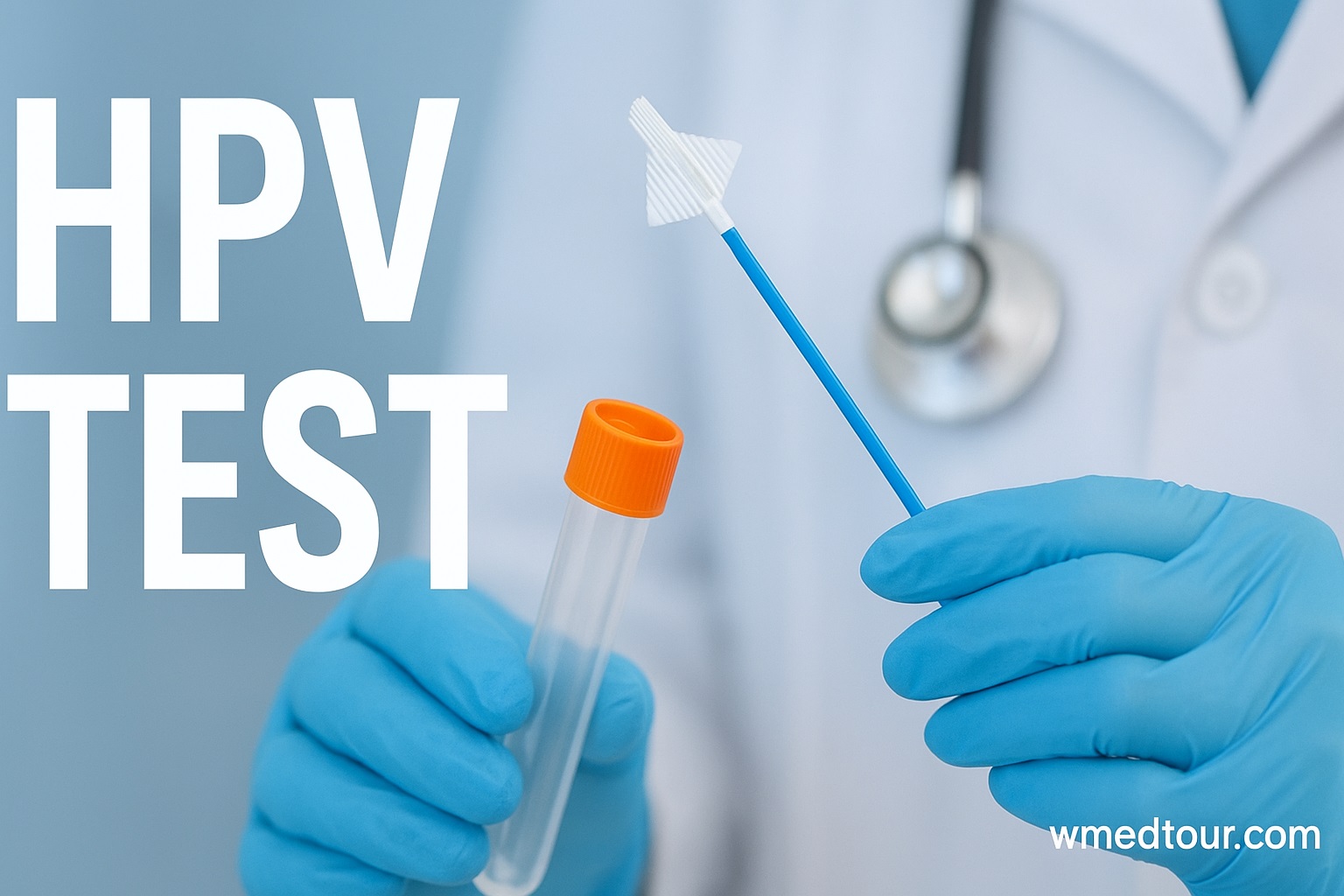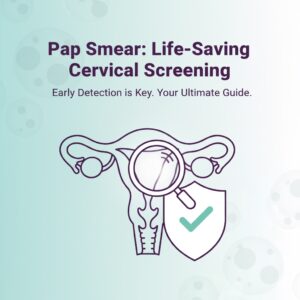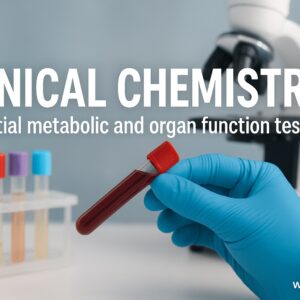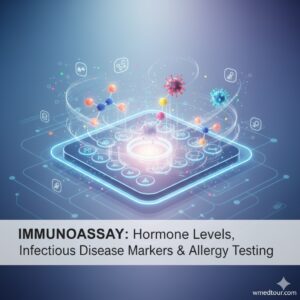Description
🎯 The HPV Test: Essential Screening for Cervical Cancer Prevention
✨ Executive Summary: Why the HPV Test Matters
The **HPV Test**, which screens for high-risk types of the Human Papillomavirus, has revolutionized cervical cancer prevention. This non-invasive check detects the underlying viral cause of over 90% of cervical cancers, often long before cell changes even begin. By combining the **HPV Test** with the Pap Smear (a process called co-testing), doctors significantly increase screening accuracy for women over 30. Therefore, leading global healthcare providers prioritize this test as a standard component of preventative care and comprehensive health checkups. This guide clarifies who needs the test, explains the results, and shows you how to manage your health proactively.
For individuals and medical professionals alike, understanding the high sensitivity and strategic role of the HPV Test is paramount. Many leading international facilities, including those we partner with in destinations like Turkey and Iran, adhere to global guidelines. As a result, they incorporate this screening to ensure patients receive the highest standard of care during their medical journey. We connect you with expert physicians who specialize in women’s health and oncology, providing peace of mind during your screening.
🔬 Understanding the HPV Test and How it Works
The **HPV Test** is simple: it looks for the DNA or RNA of high-risk HPV types (like types 16 and 18) in cervical cells. Crucially, it does not look for cell changes; instead, it looks for the virus itself. The presence of the high-risk virus signals a heightened risk that future cell changes may occur, giving you an early warning. The procedure is almost identical to a Pap Smear. The healthcare provider simply collects a cell sample from the cervix and sends it for molecular analysis.
📅 Screening Guidelines: Who Needs an HPV Test?
Modern guidelines increasingly favor the **HPV Test** or co-testing (HPV plus Pap Smear) due to its superior sensitivity and ability to extend screening intervals. Generally:
- 👧 Ages 21–29: Primary screening is typically a Pap Smear alone.
- 👩 Ages 30–65: Co-testing (Pap Smear + HPV Test) is the preferred standard every **five years**. Alternatively, primary HPV screening alone every five years is acceptable.
- ⚕️ Special Risks: Women with a history of abnormal results or specific immunosuppression may require more frequent testing.
Always consult a specialist in our Gynecological Surgery Department to determine the best schedule for your needs. We also assist with preparing for these procedures through our pre-travel checklists.
🆚 HPV Test vs. Pap Smear: Co-Testing Explained
Many patients confuse the two tests. However, the Pap Smear and the HPV Test serve distinct, yet complementary, functions. Combining them offers the most comprehensive protection against cervical cancer, resulting in highly effective screening strategies.
| Test | What It Detects | Role in Screening |
|---|---|---|
| Pap Smear | Abnormal or precancerous cell changes (cytology). | Identifies current lesions that require immediate follow-up. |
| HPV Test | The presence of high-risk viral DNA/RNA (the underlying cause). | Identifies women at high risk for future lesions; predicts risk effectively. |
| Co-Testing | Both the virus and any associated cell changes. | The gold standard for women aged 30-65, offering maximum sensitivity. |
✅ Benefits and Limitations of the HPV Test
While the test is invaluable, informed decision-making means understanding both its strengths and weaknesses. Therefore, we provide a balanced overview:
Pros of HPV Testing:
- ✅ Higher Sensitivity: The HPV Test rarely misses high-risk cases. This allows for safe, extended five-year screening intervals.
- ✅ Excellent Negative Prediction: A negative result gives patients significant reassurance, as their risk for developing cervical cancer in the next few years becomes extremely low.
- ✅ Objective Results: Molecular testing is less prone to human error compared to traditional cellular analysis.
Cons and Considerations:
- ⚠️ Widespread Virus: HPV is incredibly common, especially in young women. Many positive results may indicate a virus the body will clear naturally, potentially causing unnecessary anxiety.
- ⚠️ Age Limits: Doctors generally avoid the test for women under 30. Younger women clear the virus quickly, so a positive result often lacks clinical significance.
- ⚠️ Follow-Up Required: A positive result necessitates careful follow-up and monitoring, often including a Colposcopy, but does not confirm cancer.
❓ Interpreting Your HPV Test Results
Receiving an HPV positive result can be frightening, but you must remember: **HPV Test** positivity is not a cancer diagnosis. It signifies risk. Your doctor will use specific protocols based on the result, guided by authoritative sources like our Oncology Department specialists.
- 💚 HPV Negative: Your risk is very low. Doctors recommend repeating the co-test in five years.
- 💛 HPV Positive (Pap Negative): You have the high-risk virus, but it has caused no immediate cell damage. The doctor will likely recommend repeating the test in one year.
- ❤️ HPV Positive (Pap Abnormal): This indicates a significant risk. The doctor will order a Colposcopy to examine the cervical cells closely and potentially perform a biopsy.
Understanding the difference between screening and diagnosis is key. Techniques like liquid biopsy show future potential, but the HPV test remains the current standard for primary prevention.
🗺️ Case Study: The HPV Test in International Care
Patient Journey: Sofia’s Early Warning in Istanbul
Sofia, a 38-year-old executive, traveled to Istanbul for a comprehensive medical check-up. She specifically chose a clinic known for its advanced diagnostics, which included the co-testing strategy (Pap Smear + HPV Test). Her Pap Smear returned normal, but her **HPV Test** came back positive for a high-risk strain.
This early viral detection, though alarming, gave Sofia a valuable head start. She did not have cancer, but she did have the virus. WMedTour immediately arranged a specialist appointment in Istanbul—a top medical tourism destination—to discuss her monitoring plan. She now knows she requires annual follow-up testing and monitoring, rather than the standard five-year interval. Her proactive decision to choose advanced screening in Turkey, instead of waiting, secured her long-term health. This approach aligns perfectly with innovative treatments like new cancer treatment methods, emphasizing early and personalized intervention.
Do not delay this life-saving screening. For assistance with scheduling your comprehensive **HPV Test** and women’s health checkup at a trusted global facility, contact WMedTour.










Reviews
There are no reviews yet.